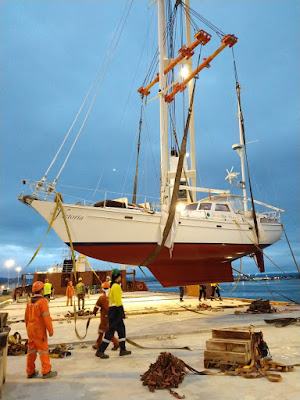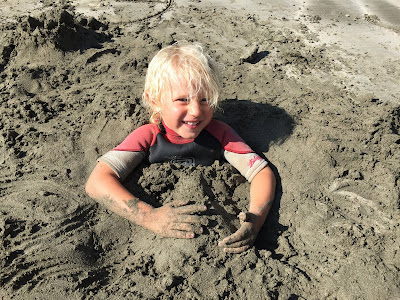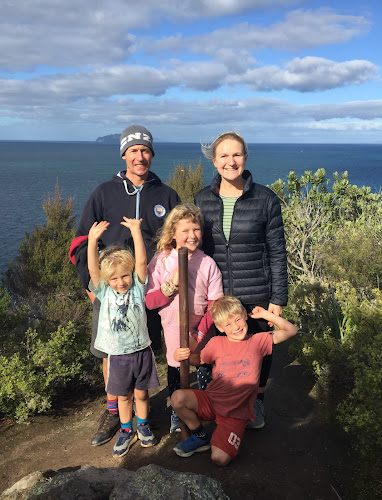Sleep, self-sufficiency and manta rays
Moored at Musket Cove Yacht Club, Malolo Island, 17 46.2S, 177
11.4E
Places visited since previous blog:
Yasawairara Bay, Yasawa Island, 16 42.5S, 177 39.4E
Nabukero / Sawa-I-lau Island, 16 50.8S, 177 28.0E
Blue Lagoon, 16 56.7S, 177 22.0E
Manta Ray Bay, Drawaqa Island, 17 10.3S, 177 11.3E
Nalauwaki Bay, Waya Island, 17 16.4S, 177 07.0E
Navadra Island, 17 27.5S, 177 02.6E
I have fallen asleep sitting in front of my laptop for the
past three nights trying to start this blog. It's five months since we left home, four months since we moved on to the boat,
and two months since we set sail from New Zealand, and Angus and I are exhausted! I think the cause is a combination of visiting lots of places, squeezing in endless activities and fun every day,
and meeting the seemingly constant needs and demands of our three darling
children plus the good ship Victoria, from the moment we wake up until the second
our weary heads hit the pillow. In some
respects, the children part is very similar to life at home, except that we
never escape to go to work, or pack them off to school / pre-school / friends’
houses. One major difference contributing
to our sleep deprivation is that we are much more pre-occupied with external conditions
than when on dry land. At home, we never
go to sleep worrying if our house could drag its anchor on to a reef when the
wind gets up, or whether a nearby house might swing into us when the tide
turns. We don’t get up when we hear a particularly
strong gust of wind to check that we are still in the same place, or start shutting
hatches and filling the water tanks if it rains. Certainly, we never get woken by a crazy
rolling motion and knocking noises, forcing us to get up and identify loose items
rolling around noisily in the cupboards, before returning to bed to adopt the
starfish position; face-down, arms and legs splayed, to minimise the chance of
falling out of bed as the boat lolls from side to side in the swell. And then there’s always the slight nagging thought
that one of the children could possibly sleepwalk up on deck without us waking up to
stop them, although they never have done, and we always shut the hatches in
front of the steps, so this would be very unlikely..
We left New Zealand just over two months ago, and we have spent
every night since then either at sea, at anchor, or on a mooring buoy, which is
cumulatively tiring. You might thing
that being tied up to a mooring would mean a better night’s sleep than at
anchor, but it can be just as perilous. Friends
recently left their boat on a resort mooring and went inland for the day to visit
some waterfalls. In their absence, the
boat set off on its very own adventure – mooring rope, chain and enormous heavy
weight still attached. It drifted two
miles out to sea, which fortunately was open water, before a passing boat spotted
the vessel was rather nose-down, going very slowly, and had no-one on
board. A kind rescuer hopped on, started
the engine and brought the boat (plus mooring!) slowly back to shore. This has led us to review our boat security; previously
we always locked the boat when we left it.
Now we have changed our policy (depending on where we are, obviously) as
it seems more likely that someone will be coming on board to help us out than
to rob us. Tonight is the first night since
Opua that we can walk ashore from the boat, which, now that we are firmly tied
up, is a major excitement for all of us.
It took a couple of attempts, plus two friendly dinghies acting as tug
boats, to help us drop our anchor in the correct place and reverse backwards into
a strong breeze to tie our stern to the pontoon. There’s a big rally party here at Musket Cove
Marina tomorrow. There is also a swimming
pool, laundry, shop, and rubbish / recycling facilities, so we will
spend a few days here sorting out our domestics, catching up with friends, and
hopefully also catching up on a few nights of sleep, before we move on.
The junior crew are all well and becoming increasingly
self-sufficient. We have reached a stage
where George and Jack can launch a kayak, pack their kit, don their lifejackets
and set off for some “George and Jack time”, but they remain unable to get their
own breakfast. This is largely due to
the cereal and bowls being out of their reach, and milk which either has to be
extracted from deep down in our top-opening fridge, or mixed up fresh from
powder. I’m planning to reorganise the
storage when I find a moment, to try and improve things. Eloise, on the other hand, is a self-sufficient
whizz in the galley and regularly rustles up porridge and pancakes, leaving a
tell-tale trail of destruction behind her.
Our friends George and Elizabeth from “Calypso” came for a sleepover the
other night, and Eloise and Calypso George made us a veritable mountain of pancakes
for breakfast. I’m sure with time they
will learn to be a bit tidier in the galley, and to clear up as they go along,
but for now we are just grateful for their culinary creations and their enthusiasm…
We had an interesting survival incident last week. The
boys and I had gone to the beach, leaving Angus and Eloise on board. Angus was busy doing jobs, running the engine, cooling
the freezer and making water. Eloise was
engrossed in an Arthur Ransome and refused to stop reading, so she stayed on
board while Angus went to visit another boat to collect a letter for us (Alex
Slade – the Orca stickers have finally caught up with us – thank you!). After a while, Eloise went to sneak a
marshmallow from where she had discovered I was hiding them, and that was when
she saw water gushing from under the door of the front heads (the loo) and that the whole
of the corridor carpet was underwater.
She opened the door and was met with a lot more water rushing out. Seeing that the salt-water tap which flushes
the heads was on full blast, she turned it off, then went to radio Angus for
help. He didn’t hear her as he had left
the handheld radio in the dinghy, so she shouted to our friends on Calypso. Daniel whizzed over in their dinghy, and
asked Eloise if she knew how to work the pumps.
Without hesitation she identified both the shower drain pump and the forward
bilge pump and they got going on the task in hand. Angus soon spotted the activity and he returned
to catch up on all the excitement. The
only thing left for him to do was to rinse the carpet and put it on deck to
dry. Luckily it didn’t blow overboard and
sink like the section from the galley that I washed and left on deck a couple of
weeks ago… Thank you, darling marshmallow-sneaking-Eloise,
for averting a major boat catastrophe!
We’ve had the most wonderful couple of weeks exploring the
Yasawa Islands, from north to south, and have observed that self-sufficiency amongst
the crew of Victoria is nothing compared to that on the islands. Villages are typically small, with around 200
inhabitants. Everyone catches their own
water, and has their own solar panel to charge their house battery. Near to the village are the plantations, or
allotments, where the families grow their food.
They have pigs, goats and chickens, and there is a lot of fishing –
mostly spear-fishing on the reef at night.
There are no roads or cars. The
government boat comes every few weeks with community-related supplies, and some
people have fast longboats to head to the mainland for other essentials. These people are living happily within the
means of their surroundings and their environment, in tune with the seasons,
the rainfall, the weather, the fish stocks and the sea level. It is a sobering reminder for all of us in developed
countries, that we are living way beyond the means of our planet. We are several stages removed from the
origins of our water, power and food, and the knock-on effects of our frequent flying,
and it’s all too easy not to give it much thought. But if we don’t wake up, listen to and support
the climate change lobby, and act on their messages, we will have to look these
communities in the eye, as well as our own children, and explain why we didn’t
do more, before it was too late.
We met a lovely, extremely self-sufficient, Fijian couple
called Toki and Mary last week. They run a locally famous organic farm on the side of a hill near to Blue Lagoon (where
the 80s film was made). On a calm day in
a well-powered dinghy it would be a fairly easy trip from the anchorage. The day we went, it was blowing 20-25 knots,
which is quite a lot for our 3.5 horse power engine, so the journey there was
almost 45 minutes and we were soaked through when we arrived. The final approach is rather fun; there’s a
gap in the mangroves which becomes a winding waterway, eventually opening up to
a hurricane hole with a 40-foot catamaran tucked away. Toki must have heard us coming; he met us as
we stepped ashore and walked us up the hill to his farm. We filled our trusty blue Ikea bag with
produce as he cut it for us; limes, cucumbers, tomatoes, pak choi, spinach,
pawpaws, wee fruits (much hilarity!), radishes, lettuce, basil and a coconut. Mary priced it all for us and while we
settled up, the kids played with the farm kittens and pet baby turtle. As we left in the dinghy, Toki set off in his
wooden sailing boat, with an identical little engine to ours, to deliver a
vegetable order to one of the Blue Lagoon resorts. It looked a hard but happy life. When we asked who helped on the farm, he said
his children did, after school and at the weekends. We are definitely doing something wrong.. despite
daily encouragement, ours are still pretty reluctant to clear the table after a
meal or hang out the wet swimmers at the end of the day..
Other highlights of our time in the Yasawas have been spending
lots of time with Bonaire (the Davidsons from Winchester), swimming in caves,
windsurfing, sailing dinghies, hiking across islands, climbing some big hills, beach
cricket, evening fires, surfing breakers on our kayak (and later getting the
whole family off the beach between the breaking waves in the kayaks and SUP), and
looking for Manta Rays. The aptly named
Manta Ray pass was a fun drift snorkel, with a knot or two of tide whooshing us
through, and we saw wonderful coral and fish, but only one brief glimpse of a
manta ray. It was huge and majestic and
exceeded all expectations, even for the small amount of time we managed to keep pace with it. We were well rewarded on the
shark front, seeing several majestic white tipped reef sharks lying in wait on
the sandy bottom, or swimming along sleekly, patrolling the local area for any
lunch possibilities. We have seen two pods
of dolphins, welcoming us in as we arrive at new islands, playing on our bow,
darting first one side then the other like silvery bullets. They are such joyful, playful and elegant animals;
it’s magical to see them.
It’s late here now and it looks like we are in for an
excellent sleep from the rolling and wind point of view – it’s flat calm, the
wind has dropped, a brief rain shower earlier has come to nothing, and we are
well attached to the pontoon. There is, however,
the after-party from a wedding going strong two boats down from us, so who
knows how late they will carry on. The
music’s pretty good, so hopefully it will lull me to sleep; everyone else on Victoria
seems to be out for the count and completely oblivious!
We have about ten more days in Fiji before we set sail for
Vanuatu, so time for a bit of a rest and then a few more Fijian adventures before
we head west again.
Love to all from
Laura, Angus, Eloise, George and Jack Xxx




Comments
Post a Comment